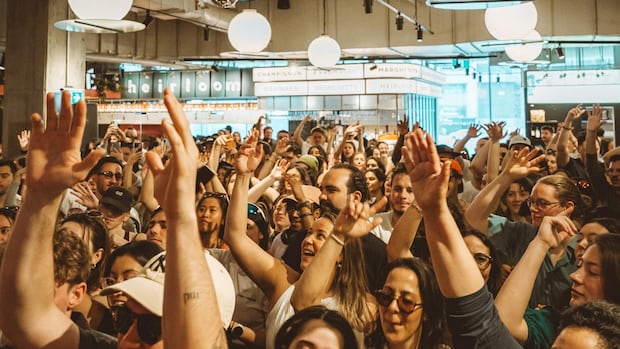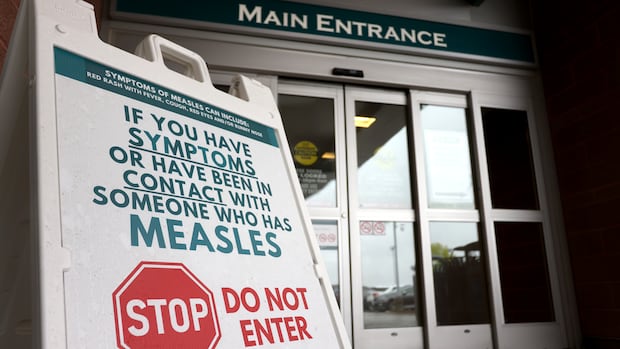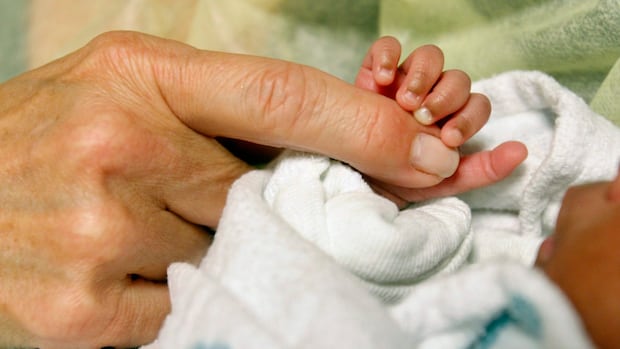Daytime parties are trending across Canada, with people trading alcohol and all-night clubbing for coffee and croissants.
One such party is Croissound in Montreal, which is rethinking nightlife culture by gathering local DJs at cafés. So far, it’s presented four Canadian events this year, with thousands of attendees. Its most recent party was a free, ticketed event at a popular Montreal food court.
The Coffee Party, which calls itself “a global movement reimagining how people connect,” has held several events in Toronto since late last year.
An increasing number of these sober daytime events seem to be popping up. There have been parties in Vancouver and Edmonton, and even in places like Kazakhstan and Singapore.
And in August during the National Bank Open tennis tournament, Sobeys Stadium in Toronto is playing host to a Coffee Party event with all-you-can-eat pastries and bottomless coffee for $25.
Across Canada this summer, more partygoers are opting to hit the dance floor in the daylight — a trend some say tracks with society’s changing lifestyle priorities.
An outgrowth of the wellness movement
Daytime parties represent a shift in how wellness and community are being highlighted in a post-pandemic economy where real-life experiences are valued, experts say.
Salima Jadavji, a clinical social worker, psychotherapist and podcaster, said she sees this growing interest as an outgrowth of the wellness movement and as part of a desire for in-person social experiences that are curated.
“Sustainable self-care doesn’t have to sound boring, it really is what brings you joy and what’s good for you,” she said.
“These gatherings also reflect a broader cultural shift in people prioritizing and attending to their mental well-being … people are shifting away from escapism to intentionality.”
Croissound is a party from 11 a.m. until 2 p.m. for all ages. Experts say this type of event without alcohol is part of a generational shift.
For some, that’s a move away from an alcohol-fuelled nightlife to healthier, sober daytime gatherings.
“While those are the trends of what we’re seeing, you can create it in any which way that you want for yourself,” Jadavji said.
This is also something Emily Lyons has been observing.
Lyons, the founder and CEO of Femme Fatale Media, has been planning and hosting events since 2009. She started with local Toronto events but has since expanded across North America.
“When we started, it was all nightclubs, nightlife, galas, things like that in the evening,” she said. “But over the years, there’s been a massive shift, so that’s only a very small fraction of what we do now.”
Lyons said recent wellness trends and the move toward alcohol-free drinks have contributed to the rising popularity of daytime parties.
A generational shift
In a report released last October based on a 2023 survey, Statistics Canada noted that young people between the ages of 18 and 22 abstained from alcohol at a higher rate than those in older age groups, and a lower proportion of young people drank seven or more alcoholic drinks in the past week compared with older Canadians.
There’s also greater public awareness of the link between alcohol use and health issues, including cancer.
Markus Giesler, a professor of marketing at York University’s Schulich School of Business in Toronto, said younger generations seem to be less focused on alcohol consumption and more interested in gatherings that promote wellness and balance.

Giesler attributes this to a decline in real, organic social encounters during the COVID-19 pandemic and to a desire for entertainment that’s affordable these days.
He said members of Gen Z — typically born between 1997 and 2012 — tend to spend their money on more meaningful social experiences. The rise of the gig economy means younger consumers have more flexibility with their scheduling — driving for Uber at night, for example, and using the day for social encounters, he said.
Giesler said he’s found that evenings aren’t as focused on communal gatherings as they were in the past. “Community is valued differently than it used to be,” he said. “Sunlight is the new strobe light.”
A shift for businesses, too
These lifestyle changes are also affecting businesses.
“These event spaces need to also think very differently about what parties are all about these days,” Giesler said.
He said he finds that younger generations have become more mindful of others who want to limit their alcohol consumption.
“Different things matter now. Quality conversation is more important than the experience of clubbing,” Giesler said.

“Understanding these changes in consumption is the key to the event spaces and organizers of these parties,” he said. “They’re being shaped by, and shape this trend, I would say.”
Spaces for arts and crafts groups, board games and activities that bring people together are benefiting from this trend, Giesler said.
Lyons, of Femme Fatale Media, said she’s also found that things have changed drastically for her business, and she’s no longer spending as much time tearing down events in the middle of the night.
“For us in the event world, it’s been a total reset,” she said. “Somebody said recently that brands want to be associated with clarity, not chaos, and I loved that because I feel like the daytime events are just so much more aligned with how people actually want to live.”
Lyons said she’s seen a redesign of nightclubs into daytime venues. One example is the Toronto Event Centre — formerly Muzik nightclub — which now hosts everything from corporate events and weddings to product launches and cocktail receptions. Lyons, who’s worked with the venue for more than 15 years, said it’s adapted to changing times and also hosts wellness-focused daytime coffee events because the late-night scene wasn’t drawing the same crowds as before.
One of her other companies, Lyons Elite, a matchmaking service, is also changing the way it operates to accommodate this shift.

“For years, we hosted singles events in the evenings — rooftop mixers, cocktail-style parties — but we started seeing a growing desire for connection without the hangover, so we began testing daytime formats: brunches, coffee meetups, more casual morning networking events,” she said.
Lyons said she believes more businesses are going to be built around what she calls a new ecosystem.
“I just love that we’re redefining what a party even means,” she said. “It’s deep conversations by 10 a.m., and I personally love it because it’s so aligned with where I am now in my life and what I’m focused on.”
The CurrentGo dancing and still get to bed early — the rise of daytime parties
If staying out dancing until 3 a.m. doesn’t appeal to you like it used to, you’re not alone. Across Canada, daytime dance parties are making space for people who want to move, socialize and still be in bed before midnight. We talk to two daytime party organizers about what it means to dance in the daytime and how it’s reshaping nightlife.








